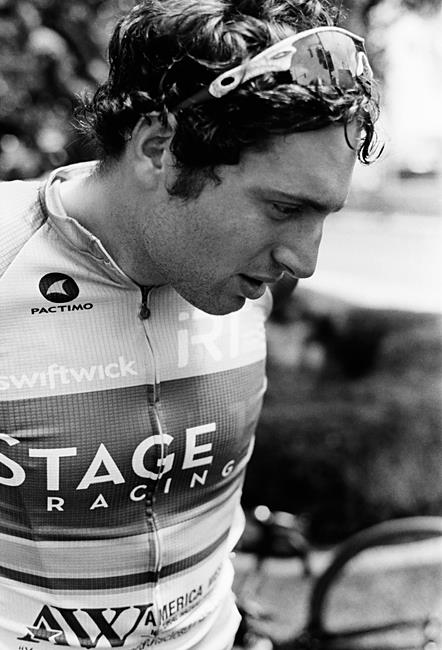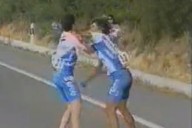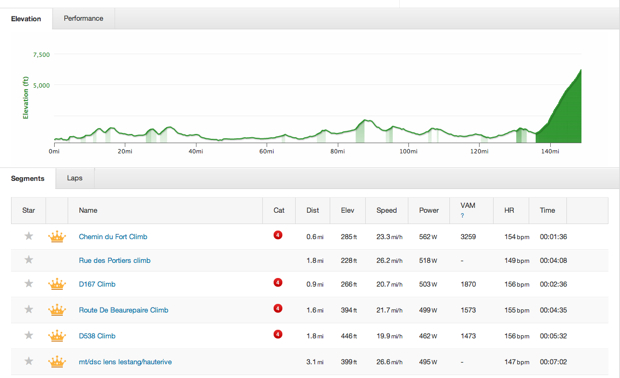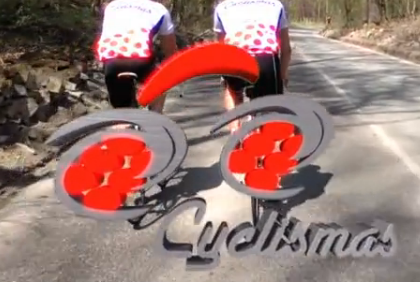Daniel Katz is a 22 year old rider for the Stage 17 Racing development team. He and his DS, Mike Roecklein (@MikeRoecklein on Twitter), were discussing the Jonathan Vaughters New York Times admission and, knowing Danny is a gifted writer, Mike suggested he should try to add his commentary to the opinions rendered by the usual suspects. We’re very pleased with how it turned out, as it’s the voice that’s been missing from the ongoing discussion.
Jonathan Vaughters’ admission to doping has prompted quite the debate. I’ve generally steered clear of the whole thing because (1) I follow politics for a living and there are much more pressing matters in the world that make this seem petty and dumb, and (2) I love cycling and this challenges my notions of “fair.” The cognitive dissonance (Vaughters is the clean guy but…) this encourages was also hard for me to fathom. I took the easy way out and decided to read the article, create my own opinion, and let it be. It doesn’t apply to me.
But it does. This sport is my obsession, I’ve contemplated leaving my job to attempt to make less or no money. This admission means I walk into work and the guy who sort of follows this stuff sees me in the office and asks what I think. Then my director suggested I write something when I was discussing it with him. So I thought about it more and I hated my conclusion.
Just Press the Button and Inflict Pain
In 1964 in the famed “Milgram Experiment,” a Yale University psychologist, Stanley Milgram, set up a social psychology scenario. Experiment participants from the general public along with a set of confederates were separated into groups. The participants in the experiment did not know the confederates were actors. The participants and confederates were separated based on a rigged drawing that would make the participants “teachers” and confederates “students.” The teachers were put in one room and told that the confederates were in another, hooked up, so when asked a set of questions, if wrong, the teacher would push a button that would shock the student. The teachers felt a slight shock to reveal the sensation. The shock was supposed to increase in voltage for each wrong answer.
The students got a lot of answers wrong and the results of the experiment were, well, kind of shocking. Milgram polled other students and faculty asking what they thought would happen. Many thought nobody would shock the students in the experiment. Some of the participants even said they wouldn’t do it.
65% of participants pressed the button and went along with increased shocking.
The confederate, of course, wasn’t hooked up to anything. However, the shocking maxed out at 450 volts, or so the teachers were told. At around the 135 volt mark, the confederate started complaining and said he was worried about his heart condition. Some teachers delayed at this point, wishing to go check on the student. But with coercion, many would continue the shocking. The confederate would scream and after prodding from authority, many would continue the shocking. The participant’s screaming would finally stop the shocking once the experiment maxed out. There was a lot more to this experiment, it’s quite interesting, look it up. It tells us a lot about obedience.
“I wouldn’t do that!”
That’s what many thought. Have you ever done something that has challenged your sense of right and wrong, efficient and inefficient, what you think is best and what you think is worst? Oh come on, unless you are a lot better than me, you’ve done something you thought was a bad idea because your boss, your authority figure, told you to. We’re programmed to do so. More so, you’ve wanted to advance, gain acceptance, to do that thing your boss wants you to for a raise even though you think it’s dumb. Or some scenario like that.
You hate a law, you hate a political policy, you hate a politician – but most of us do nothing. You’re afraid of being ostracized from social circles or by someone you admire. Those political activists are annoying. But without dissent, we would not move forward. Only a select few are actually able to do that, be strong-willed enough to face the realities of power. There need not be a governing body, need not be an enforcement mechanism for you to feel the influences of power. A group of people can exert power over you because you don’t want to face the social consequences. That is the basis of Marxism.
What if not making it big was as bad in your mind as being caught for doping?
Read Animal Farm.
Now an authority figure, someone you trust, tells you something that may even cause delay, may even raise questions within your own mind. But you’re young, you know nothing else. That takes you to Vaughters.
Vaughters and the Young
A young athlete lacks objectivism. Think of the kids who think all of life is based around his or her high school championship in a sport. Think about the young guy who will do whatever he is told and begin to believe it. Brainwashing isn’t hard, in fact, some say a young mind is a terrible thing not to mess with. Vaughters was likely young and impressionable. He presented his options as dope or walk out and he seemed to see racing at the top level as achieving life’s essence. Racing at a lower level, I’m inferring, wasn’t simply not as good as racing at the D1 level, it was as good as not racing at all. But now, I’m setting out into something I sought to avoid because the two-options method of framing is a matter of parlance.
Young people are impressionable. I’m 22, a college graduate, and work full time and like to think myself an independent strong thinker. Yet, when my parents tell me something, or somebody I consider an authority tells me something I listen and believe. I’m youthful and hopeful, likely just like Vaughters. The extremely young will absolutely do what they’re told, it happens frequently and sadly.
There are child soldiers in the world who are brainwashed to kill their family and friends based on an authority figure’s instruction.
This debate has been strangely framed. It’s looked at the micro and not the macro.
He Came, He Saw, He Left
What can be done for the future generation of cyclists? Teach them to think for themselves. Teach them to resist forces that are greater than their own so long as the resistance is necessary, not just youthful rebellion. Vaughters and his doping is irrelevant now. He quit and was messed up, brainwashed by it all. So he started his own clean team. Cleaning up cycling is not just a matter of getting rid of the drugs, it’s a matter of getting rid of the bad influences, the train of thought that says it’s worth it.
If doping is moral or immoral, I’m not here to debate, but you can probably guess…. I want to write because I think it’s important to see the bigger picture, not just that he doped but that he saw cycling as the end-all. He was taught being untruthful was in fact a noble lie.
Ultimately, My Take: Feel Free to disagree
We rush to the conclusion that we wouldn’t do it. But for Vaughters it wasn’t a question of morality so much as necessity. He was told there was no other way when he was young and was convinced. Young cyclists need to be aware of this. He was convinced it was simply the way to be one of the best.
I race Category 1 on the road with Stage 17 racing, a team that prides itself on being clean. But yeah, we’ve done some stuff that is “allowed” – sticky bottles at big races, maybe a boost from the team car. It seemed ok, because everybody does it. I know I’m not genetically gifted and I tell myself that I would never dope.
It takes that annoying guy to dissent. It takes…Vaughters to quit, be outspoken, write an op-ed in the New York Times while he runs a team that prides itself on removing riders from the situation Vaughters faced.
But what do I know, I’m just an amateur. There’s a lot of “I think” in this piece and that should be considered.
So I finish by saying I don’t think this is simply about Vaughters, but about how the sport treats its young, treats itself. Young riders will not be immune, as Vaughters was not.
Yeah I wouldn’t dope and you wouldn’t dope. But what if our world views, our paradigms were not from behind the computer but behind a set of handlebars on the cusp of riding in the Tour? I’d like to think I wouldn’t dope.
Take the Vaughters article or any other article or person who confesses as a form of constructive dissent. It’s annoying because we have to face our own cognitive dissonance. Doping is a problem and it’s not as simple as “yes” or “no.” The Vaughters article is the kind of thing that drives society forward.
I hope this leads not to “he’s bad” or “he’s good” but actual deliberative debate. I think there has been some.
Oh, by the way – wealth distribution in the United States, measured by the Gini index, is on par with such countries as Russia. College and health care are inaccessible and people are in poverty. Yeah we’re talking about bicycles.















No Comments